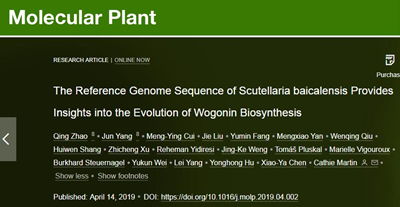|
In April 2019, scientists from the CAS Institute of Plant Physiology and Ecology, CAS Shanghai Chenshan Botanical Research Centre, and UK-based John Innes Centre jointly delivered a high-quality reference genome of the medicinal mint Scutellaria baicalensis, or Huang Qin -- the first time that the evolution/synthesis mechanism of anticancer components in it was elucidated.
Huang Qin (also commonly known as Chinese Skullcap) has been used in TCM for more than 2,000 years. Its root contains wogonin, an anticancer active substance that also has antibacterial, antiviral, liver protection and neuroprotective effects. However, due to the lack of genome information, the breeding, cultivation and genetic improvement of the plant have long been an obstacle. The aforementioned joint project laid a good foundation for the artificial synthesis of wogonin and provided a reference for genetic analysis of other mint-family plants.

|

